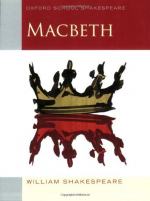|
This section contains 5,617 words (approx. 19 pages at 300 words per page) |

|
SOURCE: “Virtue's Sacrifice: A Machiavellian Reading of Macbeth,” in Studies in English Literature 1500-1900, Vol. 31, No. 2, Spring, 1991, pp. 273-86.
In the following essay, Riebling probes the Machiavellian conflict between politics and morality in Macbeth.
“I love my city more than I love my soul,” Machiavelli wrote in a letter to a friend. If we take him at his word—including the belief that he has a soul—Machiavelli is describing the ultimate patriotic sacrifice. In both of his major theoretical works, The Prince and The Discourses, he presents this sacrifice as more likely the deeper one ventures into politics, and as virtually unavoidable for the prince. Machiavelli's works shocked sixteenth-century audiences, who were accustomed to seeing Christian and civic virtue as interchangeable; in his version of truth, “la verità effettuale,” political virtù is ineluctably at odds with religion and its rules. The English were particularly appalled by Machiavelli's...
|
This section contains 5,617 words (approx. 19 pages at 300 words per page) |

|


